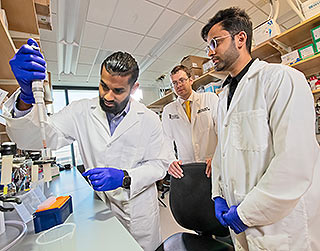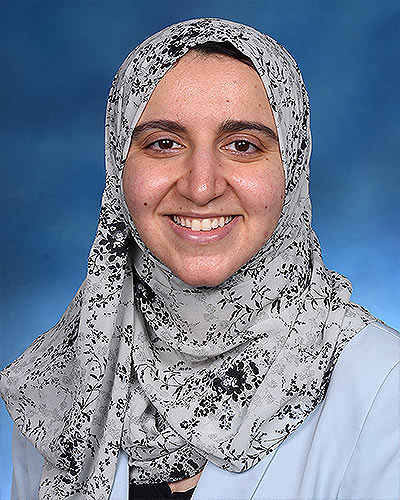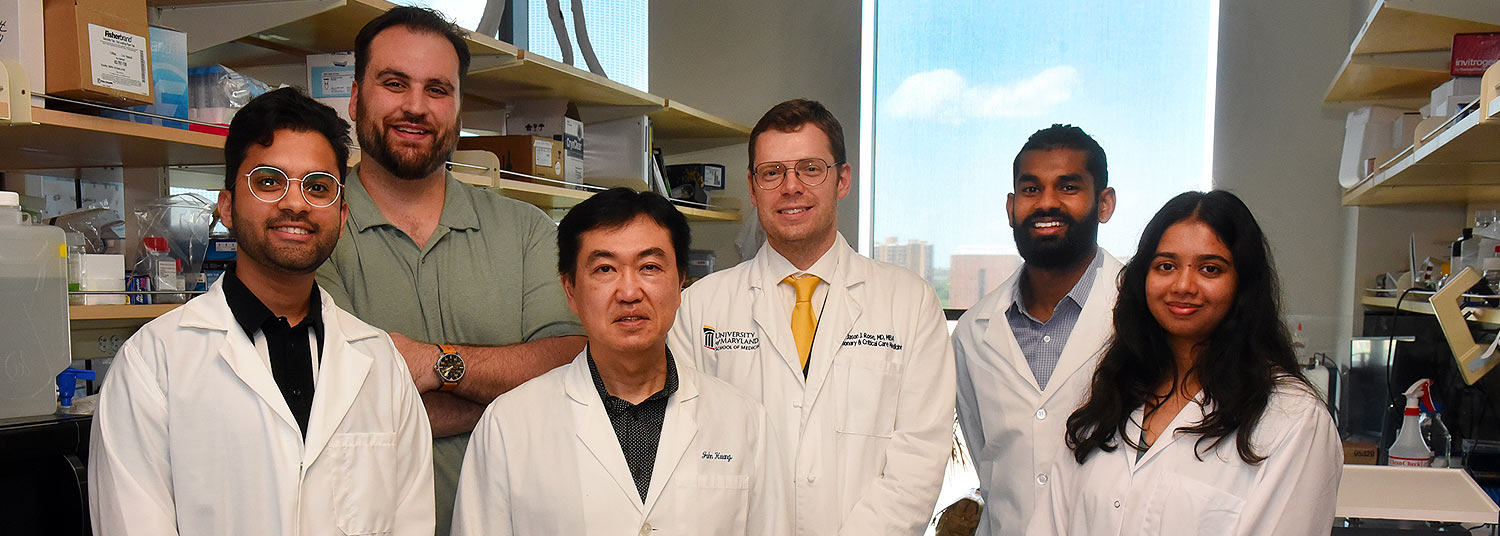Our Research
 The inhalational toxicology and resuscitation group, led by Dr Rose and Dr Xu, focuses on studying and creating interventions for inhalational toxicology, respiratory failure, and resuscitation.
The inhalational toxicology and resuscitation group, led by Dr Rose and Dr Xu, focuses on studying and creating interventions for inhalational toxicology, respiratory failure, and resuscitation.
Carbon monoxide (CO) is one of the leading causes of poisoning deaths globally and can lead to debilitating effects to the body and brain in survivors. However, the current treatment options for this common poisoning are limited to oxygen administration-based therapies, which are only modestly effective, especially in cases of high CO exposure. Our team has developed therapies to directly target CO itself, engineering hemoprotein-based antidotes to enhance their intrinsic properties to bind CO with high affinity and then sequester and remove it from blood and tissues. Some of our engineered proteins include variations of hemoglobin (Hb), neuroglobin (Ngb), and regulator of CO metabolism (RcoM). In mouse models of high CO poisoning, we have found these recombinant proteins efficiently scavenge CO from the native oxygen-carrier hemoglobin in red blood cells and allow oxygen to re-bind, thus restoring normal oxygen transport and delivery. Our research aims to develop these hemoprotein antidotes and other potential therapeutic candidates for treating CO poisoning and other indications. A particular focus has recently been developing novel, heme-containing proteins as artificial oxygen carriers in the resuscitation space. We are currently supported by grants from the NIH, Department of Defense, Industry, and Foundation.
An additional focus of our research is in exploring the clinical and chemical implications of e-cigarette and vaping products, particularly on E-cigarette or Vaping Use-Associated Lung Injury (EVALI). Our team is also developing novel technologies for the management of patients with respiratory failure utilizing mechatronics and artificial intelligence for mechanical ventilation and basic resuscitation.
Team Members
Jason Rose, MD, MBA
Associate Professor of Medicine

Qinzi Xu, MD
Assistant Professor of Medicine

Anthony (Tony) DeMartino, PhD
Assistant Professor of Medicine

Youmna Abdelghany, MD
Clinical Fellow

John (Hyon) Hwang, MS
Laboratory Manager

Joshua Lawrence
Research Technician Assistant

Neha Eldho
Research Assistant

Bryan Turner
Laboratory Staff

Publications:
Dent MR, Rose JJ, Tejero J, Gladwin MT. Carbon Monoxide Poisoning: From Microbes to Therapeutics. Annu Rev Med. 2024 Jan 29;75:337-351. doi: 10.1146/annurev-med-052422-020045. PMID: 37582490
Xu Q, Rose JJ, Chen X, Wang L, DeMartino AW, Dent MR, Tiwari S, Bocian K, Huang XN, Tong Q, McTiernan CF, Guo L, Alipour E, Jones TC, Ucer KB, Kim-Shapiro DB, Tejero J, Gladwin MT. Cell-free and alkylated hemoproteins improve survival in mouse models of carbon monoxide poisoning. JCI Insight. 2022 Nov 8;7(21):e153296. doi: 10.1172/jci.insight.153296. PMID: 36173682
Rose JJ, Bocian KA, Xu Q, Wang L, DeMartino AW, Chen X, Corey CG, Guimarães DA, Azarov I, Huang XN, Tong Q, Guo L, Nouraie M, McTiernan CF, O’Donnell CP, Tejero J, Shiva S, Gladwin MT. A neuroglobin-based high-affinity ligand trap reverses carbon monoxide-induced mitochondrial poisoning. J Biol Chem. 2020 May 8,295(19):6357-6310. doi: 10.1047/jbc.RA119.010593. PMID: 32205448. PMCID: PMC7212636
Triantafyllou GA, Tiberio PJ, Zou RH, Lynch MJ, Kreit JW, McVerry BJ, Morris A, Rose JJ. Long-term outcomes of EVALI: a 1-year retrospective study. Lancet Respir Med. 2021 Dec;9(12):e112-e113. doi: 10.1016/S2213-2600(21)00415-X. Epub 2021 Oct 25. PMID: 34710356; PMCID: PMC9074850.
Rose JJ, Nouraie M, Gauthier MC, Pizon AF, Saul MI, Donahoe MP, Gladwin MT. Clinical Outcomes and Mortality Impact of Hyperbaric Oxygen Therapy in Patients with Carbon Monoxide Poisoning. Crit Care Med. 2018 Jul;46(7):e649-e655. Apr 6. PMID: 29629990. PMCID: PMC6005724.
Azarov I*, Wang L*, Rose JJ*, Xu Q, Huang XN, Belanger A, Wang Y, Guo L, Liu C, Ucer KB, McTiernan CF, O'Donnell CP, Shiva S, Tejero J, Kim-Shapiro DB, Gladwin MT. Five-coordinate H64Q neuroglobin as a ligand-trap antidote for carbon monoxide poisoning. Sci Transl Med. 2016 Dec 7;8(368):368ra173. PMID: 27928027. PMCID: PMC5206801.
Rose JJ, Wang L, Xu Q, McTiernan CF, Shiva S, Tejero J, Gladwin MT. Carbon Monoxide Poisoning: Pathogenesis, Management, and Future Directions of Therapy. Am J Respir Crit Care Med. 2017 Mar 1;195(5):596-606. Review. PMID: 27753502. PMCID: PMC5363978.
DeMartino AW*, Rose JJ*, Amdahl MB, Dent MR, Shah FA, Bain W, McVerry BJ, Kitsios GD, Tejero J, Gladwin MT. No evidence of hemoglobin damage by SARS-CoV-2 infection. Haematologica. 2020 Sep 10; Online ahead of print (12):264267. doi: 10.3324/haematol.2020.264267. PMID: 33054129. PMCID: PMC7716349.
Zou RH, Tiberio PJ, Triantafyllou GA, Lamberty PE, Lynch MJ, Kreit JW, McVerry BJ, Gladwin MT, Morris A, Chiarchiaro J, Fitzpatrick ME, Rose JJ. Clinical Characterization of E-cigarette, or Vaping, Product Use Associated Lung Injury in 36 Patients in Pittsburgh, PA. Am J Respir Crit Care Med. 2020 May 15;201(10):1303-1306. Feb 5. doi: 10.1164/rccm.202001-0079LE. PMID: 32023422. PMCID: PMC7233355

